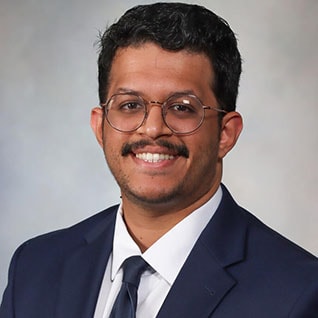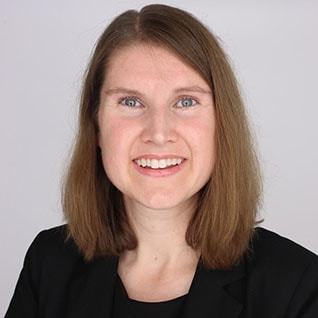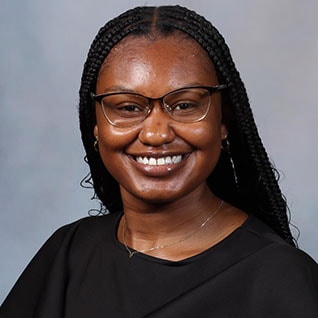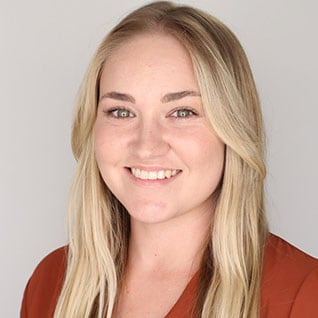/prod01/channel_2/media/mccms/content-assets/about/news/february-2020/student-research-1024-x-512-3795795_0019.jpg)
August 15, 2024
This summer, Mayo Clinic Graduate School of Biomedical Sciences welcomed its latest class of Ph.D. candidates. The students — from across the country and the world — are now beginning their training on Mayo's campuses in Arizona, Florida, and Minnesota.
The graduate school received a record 1,046 submissions last year for 45 spots in the school's eight graduate tracks. Students come to Mayo with varied scientific interests and reasons for pursuing a doctoral degree. What they all have in common is an interest in research that will bring new hope to patients.
Meet a few members of the class as they share what brought them to the graduate program.
 Shanon Rego: Motivated to learn about the brain
Shanon Rego: Motivated to learn about the brain
Hometown: Mumbai, India, and Dubai, United Arab Emirates
Research goals: "My aspiration is to contribute to the understanding of how neuroimmune factors influence the onset and progression of diseases such as Alzheimer's disease and epilepsy, among others. I aim to emphasize the importance of enhancing the connection between the scientific community and the public."
Favorite pastimes: Photography, cooking and watching cricket, soccer, and football
Shanon Rego first became curious about neuroscience when he faced a health issue as a teenager. The tests he underwent made him interested in learning more about the brain. He began exploring neuroscience research through Mayo's programs for young scientists.
As a student at the University of South Florida, he joined the Summer Undergraduate Research Fellowship (SURF) and worked with neuroimmunology researcher Sandro Ferreira Da Mesquita, Ph.D. After completing his degree, he stayed on in Dr. Da Mesquita's lab, conducting research in the Postbaccalaureate Research Education Program (PREP). The program gave him the opportunity to develop his own project, present his findings at a Society for Neuroscience conference and apply to the neuroscience track of the Ph.D. program at Mayo Clinic in Florida. "My exposure to the field of neuroimmunology has been eye-opening," he says. "The more I learn about the intricate connections between these different systems, the greater my curiosity grows."
 Chelsea Powell, M.D.: Using biostatistics to improve patient care
Chelsea Powell, M.D.: Using biostatistics to improve patient care
Hometown: Frederick, Maryland
Research goals: "My clinical work has exposed me to the challenges of applying current data to patient care. I'm interested in the methodologies we use to answer tough medical questions, specifically the integration of randomized and observational data to inform our clinical practice."
Favorite pastimes: Running, hiking, and reading
Chelsea Powell, M.D., is a general surgery resident at Mayo Clinic School of Graduate Medical Education. She's also one of the first five matriculants in the graduate school's newly established Clinician-Scientist Academic Research Excellence Ph.D. (CARE) program. Through the program, residents and fellows can pause their clinical training to pursue graduate-level studies in biomedical research in an area of their choice.
For Dr. Powell, joining the Clinical and Translational Science graduate track with a concentration in applied biostatistics is another way to improve her care of patients. "While my surgical residency is devoted to cultivating my clinical acumen, developing the skillset necessary to perform quality research requires similar attention," she says. "I view my graduate studies not as a departure from my training but as an integral component of it, and I feel fortunate to have the opportunity to pursue this at Mayo Clinic."
 Alani Perkin: Delving into genetics to address cancer
Alani Perkin: Delving into genetics to address cancer
Hometown: Chicago, Illinois
Research goals: "My mother is a breast cancer survivor, and her journey inspired my decision to investigate cancer during my predoctoral studies. I hope to address the genetic risk factors involved in cancer development that can be used as methods of prevention and to develop patient-specific treatments. Because race plays a significant role in many cancers, I aim to incorporate a focus on health disparities in my Ph.D. work."
Favorite pastimes: Playing basketball, practicing saxophone, and spending time with family
Alani Perkin has long been intrigued by the role of genetics in development and disease. As a biology major at Harris-Stowe State University, she studied gene expression in fruit flies. Her interest in cancer took off at Washington University School of Medicine when she conducted postbaccalaureate research in the cancer genetics laboratory of Jessica Silva-Fisher, Ph.D., a 2011 graduate of Mayo Clinic Graduate School of Biomedical Sciences. Perkin also explored drug development and innovation during industry internships, but the experience and mentorship in Dr. Silva-Fisher's lab provided important direction for Perkin's next steps at Mayo Clinic in Rochester.
"Dr. Silva-Fisher played a significant role in my decision to come to Mayo," says Perkin, now a student in the Biochemistry and Molecular Biology track. "She always spoke so highly of her time here and encouraged me to apply. She emphasized Mayo's dedication to diversity which was important in my choice of graduate programs."
 Jordan Parks: Aiming to improve heart health
Jordan Parks: Aiming to improve heart health
Hometown: Litchfield Park, Arizona
Research goals: "I hope to expand on research on advanced heart failure therapies. I am particularly interested in learning more about mitochondrial metabolism and its influence on prevention of cardiac disease. After completing my Ph.D., I hope to continue working within research and contribute to the clinical care of patients in the cardiovascular disease department."
Favorite pastimes: Riding horses and competing in dressage, hiking with her dog, and running.
Having family members with heart conditions, Jordan Parks had seen firsthand how cardiovascular disease can affect people's quality of life. After earning a bachelor's degree in health and exercise science from Colorado State University, she worked at Mayo Clinic as an exercise physiologist, conducting tests to evaluate heart failure. She discovered she loved connecting with patients and applying the information she'd learned during her training. The experience inspired her to become a senior research technologist in the cardiovascular research lab of Courtney Wheatley-Guy, Ph.D., who studies exercise as therapy for disease. During the four years she was a member of Dr. Wheatley-Guy's team, Parks determined the next step of her training.
"I'm a first-generation student and my parents have always emphasized the importance of education for me and my siblings. They encouraged me to pursue anything that I found interesting and to do it with a passion," says Parks, now a student in the Clinical and Translational Science track at Mayo Clinic in Arizona. "My time spent in Dr. Wheatley-Guy's lab has also been a major influence on my desire to continue my education. Having a supportive lab leader who celebrates your own personal goals helped me make the decision to pursue my Ph.D."